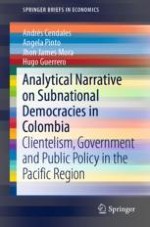2019 | OriginalPaper | Chapter
3. A Model of Public Choice with Clientelism and Corruption: Introducing the Analytical
Authors : Andrés Cendales, Nestor Garza, Santiago Arroyo
Published in: Analytical Narrative on Subnational Democracies in Colombia
Publisher: Springer International Publishing
Activate our intelligent search to find suitable subject content or patents.
Select sections of text to find matching patents with Artificial Intelligence. powered by
Select sections of text to find additional relevant content using AI-assisted search. powered by
